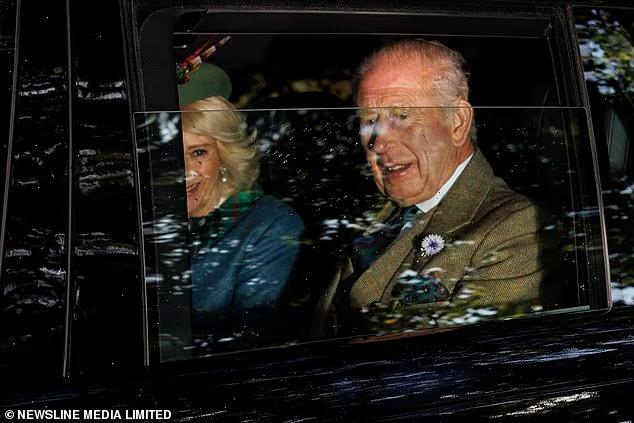King Charles has shared his fears over the harmful impact social media is having on young people and the difficulties combating it, a cleric has said.
The monarch, 76, discussed the issue with Church of Scotland Minister Reverend Tommy MacNeil at Balmoral Castle following a Sunday service at nearby Crathie Kirk.
He outlined his concerns about the risks that online platforms can pose to young people during the 40-minute discussion at the royal residence.
‘He was very concerned about the negative impact social media was having on young people in so many ways,’ Reverend MacNeil said.
‘He really understood the problems and the difficulties involved in combating them.
‘King Charles was clearly very concerned about the whole issue and negative influences on young people from social media.
‘It is almost impossible to police social media, so we need to find ways to combat that.’
The monarch, 76, discussed the issue with Church of Scotland Minister Reverend Tommy MacNeil at Balmoral Castle following a Sunday service at nearby Crathie Kirk
Charles has previously spoken about how platforms online can harm children’s mental health.
During a speech at the Prince’s Trust Invest in Futures event in 2019, he said it makes young people feel ‘inadequate’ because they often compare themselves to ‘other people they see on social media’.
Charles and Reverend MacNeil also spoke about the work The Shed Project does in helping youngsters in Stornoway on the Isle of Lewis.
‘We spoke for 40 minutes and the King was clearly well briefed about The Shed and what we are doing,’ the cleric, whose normal congregation is at Martin’s Memorial Church, added.
‘He was very engaged and 100 per cent appreciative of the work we are doing. Young people today and growing up in a different world to their parents.
‘The stuff they are accessing on their phones is frightening.’
Reverend MacNeil and his wife Donna were invited to Balmoral after he provided a sermon in front of the King and Queen Camilla at Crathie Kirk.
Of his experience with Charles, he said: ‘It was a great honour and he is a wonderful, clearly caring person.
‘I think Crathie Kirk must be the most prayed church in the Church of Scotland so that helped me overcome my nervousness.’
In April, the Duke and Duchess of Sussex called for stronger protections for children from the dangers of social media, saying ‘enough is not being done’.
Prince Harry and Meghan unveiled a memorial in New York City which is dedicated to the memory of children whose families believe harmful material online contributed to their deaths.
‘We want to make sure that things are changed so that… no more kids are lost to social media,’ Prince Harry told BBC Breakfast in New York.
‘Life is better off social media,’ he added, saying that he was ‘grateful’ that his children were still too young to be online.
‘The easiest thing to say is to keep your kids away from social media,’ Prince Harry said at an Archewell Foundation event in New York.
‘The sad reality is the kids who aren’t on social media normally get bullied at school because they can’t be part of the same conversation as everybody else.’
The royal said tech firms were ‘getting away with it’ by arguing they didn’t need to disclose information to UK families because of privacy considerations.
‘You are telling a parent, you are telling a dad and a mum that they can’t have the details of what their kid was up to on social media because of the privacy of their kid. It’s wrong,’ he said.
Prince William has also championed social media protection through two major initiatives: the Stop, Speak, Support campaign to combat cyberbullying and a social media boycott to protest online abuse in British sports.
He has publicly criticised social media companies for not adequately addressing issues like fake news and hate speech, advocating for them to prioritise user safety and implement better systems for reporting abuse.
New online safety rules, which came into effect in July, require platforms to take action to stop children seeing illegal and harmful material.
